(完整版)高考英语真题2019年全国卷3含答案听力录音文稿
- 格式:doc
- 大小:45.12 KB
- 文档页数:11
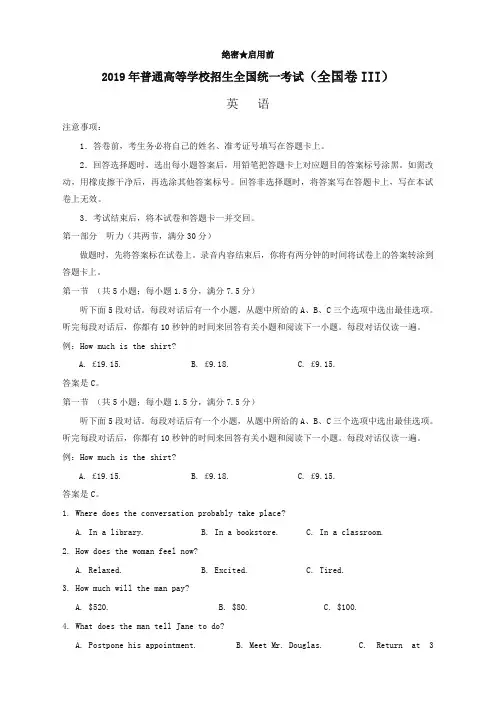
绝密★启用前2019年普通高等学校招生全国统一考试(全国卷III)英语注意事项:1.答卷前,考生务必将自己的姓名、准考证号填写在答题卡上。
2.回答选择题时,选出每小题答案后,用铅笔把答题卡上对应题目的答案标号涂黑。
如需改动,用橡皮擦干净后,再选涂其他答案标号。
回答非选择题时,将答案写在答题卡上,写在本试卷上无效。
3.考试结束后,将本试卷和答题卡一并交回。
第一部分听力(共两节,满分30分)做题时,先将答案标在试卷上。
录音内容结束后,你将有两分钟的时间将试卷上的答案转涂到答题卡上。
第一节(共5小题;每小题1.5分,满分7.5分)听下面5段对话。
每段对话后有一个小题,从题中所给的A、B、C三个选项中选出最佳选项。
听完每段对话后,你都有10秒钟的时间来回答有关小题和阅读下一小题。
每段对话仅读一遍。
例:How much is the shirt?A. £19.15.B. £9.18.C. £9.15.答案是C。
第一节(共5小题;每小题1.5分,满分7.5分)听下面5段对话。
每段对话后有一个小题,从题中所给的A、B、C三个选项中选出最佳选项。
听完每段对话后,你都有10秒钟的时间来回答有关小题和阅读下一小题。
每段对话仅读一遍。
例:How much is the shirt?A. £19.15.B. £9.18.C. £9.15.答案是C。
1. Where does the conversation probably take place?A. In a library.B. In a bookstore.C. In a classroom.2. How does the woman feel now?A. Relaxed.B. Excited.C. Tired.3. How much will the man pay?A. $520.B. $80.C. $100.4. What does the man tell Jane to do?A. Postpone his appointment.B. Meet Mr. Douglas.C. Return at 3o’clock.5. Why would David quit his job?A. To go back to school.B. To start his own firm.C. To work for his friend.第二节(共15小题;每小题1.5分,满分22.5分)听下面5段对话或独白。
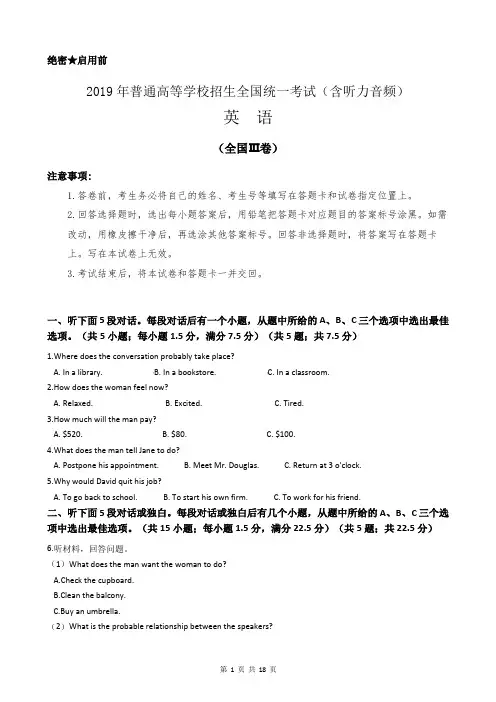
绝密★启用前2019年普通高等学校招生全国统一考试(含听力音频)英语(全国Ⅲ卷)注意事项:1.答卷前,考生务必将自己的姓名、考生号等填写在答题卡和试卷指定位置上。
2.回答选择题时,选出每小题答案后,用铅笔把答题卡对应题目的答案标号涂黑。
如需改动,用橡皮擦干净后,再选涂其他答案标号。
回答非选择题时,将答案写在答题卡上。
写在本试卷上无效。
3.考试结束后,将本试卷和答题卡一并交回。
一、听下面5段对话。
每段对话后有一个小题,从题中所给的A、B、C三个选项中选出最佳选项。
(共5小题;每小题1.5分,满分7.5分)(共5题;共7.5分)1.Where does the conversation probably take place?A. In a library.B. In a bookstore.C. In a classroom.2.How does the woman feel now?A. Relaxed.B. Excited.C. Tired.3.How much will the man pay?A. $520.B. $80.C. $100.4.What does the man tell Jane to do?A. Postpone his appointment.B. Meet Mr. Douglas.C. Return at 3 o'clock.5.Why would David quit his job?A. To go back to school.B. To start his own firm.C. To work for his friend.二、听下面5段对话或独白。
每段对话或独白后有几个小题,从题中所给的A、B、C三个选项中选出最佳选项。
(共15小题;每小题1.5分,满分22.5分)(共5题;共22.5分)6.听材料,回答问题。
(1)What does the man want the woman to do?A.Check the cupboard.B.Clean the balcony.C.Buy an umbrella.(2)What is the probable relationship between the speakers?A.Husband and wife.B.Employer and employee.C.Shop assistant and customer.7.听材料,回答问题。
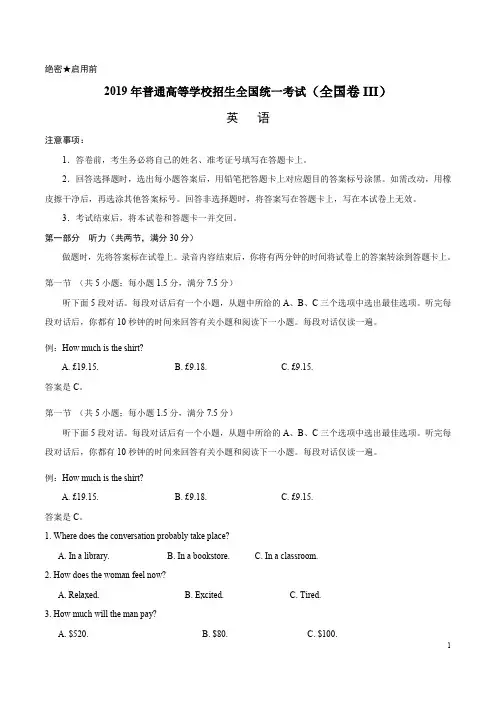
绝密★启用前2019年普通高等学校招生全国统一考试(全国卷III)英语注意事项:1.答卷前,考生务必将自己的姓名、准考证号填写在答题卡上。
2.回答选择题时,选出每小题答案后,用铅笔把答题卡上对应题目的答案标号涂黑。
如需改动,用橡皮擦干净后,再选涂其他答案标号。
回答非选择题时,将答案写在答题卡上,写在本试卷上无效。
3.考试结束后,将本试卷和答题卡一并交回。
第一部分听力(共两节,满分30分)做题时,先将答案标在试卷上。
录音内容结束后,你将有两分钟的时间将试卷上的答案转涂到答题卡上。
第一节(共5小题;每小题1.5分,满分7.5分)听下面5段对话。
每段对话后有一个小题,从题中所给的A、B、C三个选项中选出最佳选项。
听完每段对话后,你都有10秒钟的时间来回答有关小题和阅读下一小题。
每段对话仅读一遍。
例:How much is the shirt?A. £19.15.B. £9.18.C. £9.15.答案是C。
第一节(共5小题;每小题1.5分,满分7.5分)听下面5段对话。
每段对话后有一个小题,从题中所给的A、B、C三个选项中选出最佳选项。
听完每段对话后,你都有10秒钟的时间来回答有关小题和阅读下一小题。
每段对话仅读一遍。
例:How much is the shirt?A. £19.15.B. £9.18.C. £9.15.答案是C。
1. Where does the conversation probably take place?A. In a library.B. In a bookstore.C. In a classroom.2. How does the woman feel now?A. Relaxed.B. Excited.C. Tired.3. How much will the man pay?A. $520.B. $80.C. $100.4. What does the man tell Jane to do?A. Postpone his appointment.B. Meet Mr. Douglas.C. Return at 3 o’clock.5. Why would David quit his job?A. To go back to school.B. To start his own firm.C. To work for his friend.第二节(共15小题;每小题1.5分,满分22.5分)听下面5段对话或独白。
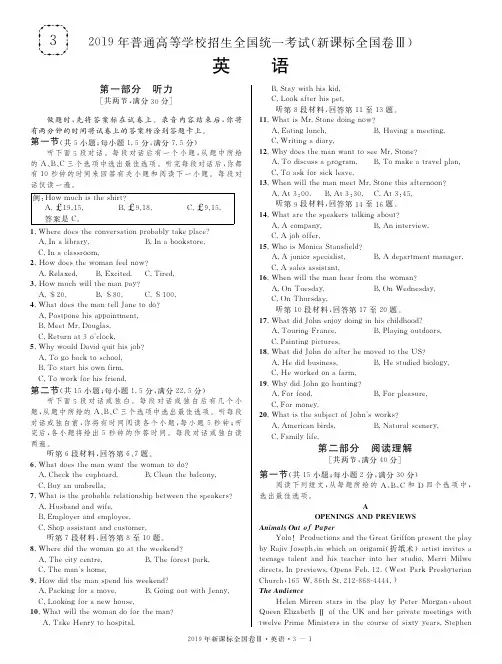
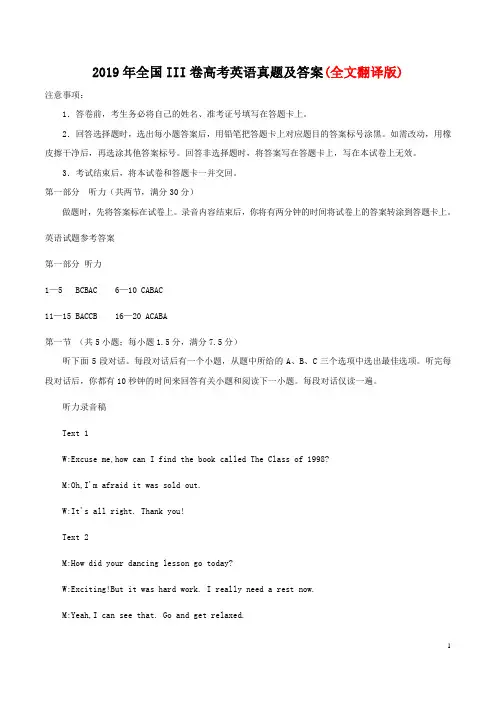
2019年全国III卷高考英语真题及答案(全文翻译版)注意事项:1.答卷前,考生务必将自己的姓名、准考证号填写在答题卡上。
2.回答选择题时,选出每小题答案后,用铅笔把答题卡上对应题目的答案标号涂黑。
如需改动,用橡皮擦干净后,再选涂其他答案标号。
回答非选择题时,将答案写在答题卡上,写在本试卷上无效。
3.考试结束后,将本试卷和答题卡一并交回。
第一部分听力(共两节,满分30分)做题时,先将答案标在试卷上。
录音内容结束后,你将有两分钟的时间将试卷上的答案转涂到答题卡上。
英语试题参考答案第一部分听力1—5 BCBAC 6—10 CABAC11—15 BACCB 16—20 ACABA第一节(共5小题;每小题1.5分,满分7.5分)听下面5段对话。
每段对话后有一个小题,从题中所给的A、B、C三个选项中选出最佳选项。
听完每段对话后,你都有10秒钟的时间来回答有关小题和阅读下一小题。
每段对话仅读一遍。
听力录音稿Text 1W:Excuse me,how can I find the book called The Class of 1998?M:Oh,I'm afraid it was sold out.W:It's all right. Thank you!Text 2M:How did your dancing lesson go today?W:Exciting!But it was hard work. I really need a rest now.M:Yeah,I can see that. Go and get relaxed.Text 3M:How much is that in total?W:$100. But if you have a membership card,I can give you a 20% discount. M:Great! This is my membership card.Text 4M:Jane,I'm going out for a while.W:But you have an appointment with Mr. Douglas at 3 o'clock.M:Well,please make it another day.Text 5W:David said he would quit his job at our school.M:Really? Why would he do that?W:His friend started a firm in London. She wanted David to help her.文字1劳:对不起,我怎么能找到《 1998年的班级》这本书?玛:哦,恐怕它已经卖完了。
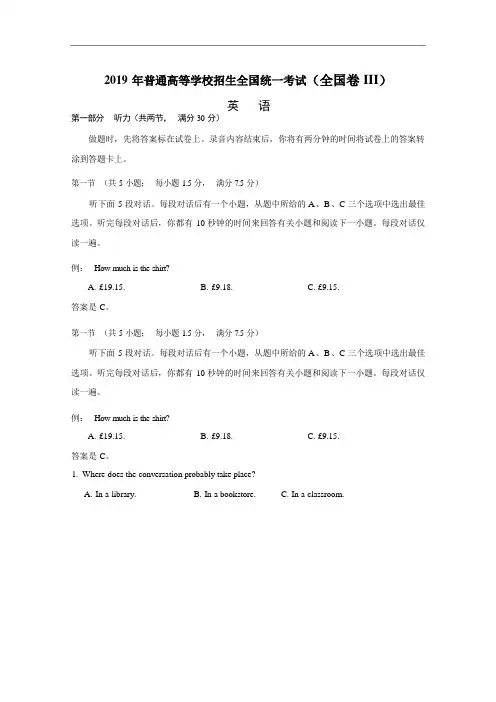
2019III英语第一部分听力(共两节,满分30 分)做题时,先将答案标在试卷上。
录音内容结束后,你将有两分钟的时间将试卷上的答案转涂到答题卡上。
第一节(共5小题;每小题1.5分,满分7.5分)听下面5 段对话。
每段对话后有一个小题,从题中所给的A 、B 、C 三个选项中选出最佳选项。
听完每段对话后,你都有10 秒钟的时间来回答有关小题和阅读下一小题。
每段对话仅读一遍。
例:How much is the shirt?A. £19.15.B. £9.18.C. £9.15.答案是C。
第一节(共5小题;每小题1.5分,满分7.5分)听下面5 段对话。
每段对话后有一个小题,从题中所给的A 、B 、C 三个选项中选出最佳选项。
听完每段对话后,你都有10 秒钟的时间来回答有关小题和阅读下一小题。
每段对话仅读一遍。
例:How much is the shirt?A. £19.15.B. £9.18.C. £9.15.答案是C。
1. Where does the conversation probably take place?A. In a library.B. In a bookstore.C. In a classroom.2. How does the woman feel now?A. Relaxed.3. How much will the man pay?A. $520.B. Excited.B. $80.C. Tired.C. $100.4. What does the man tell Jane to do?A. Postpone his appointment.B. Meet Mr. Douglas.5. Why would David quit his job?A. To go back to school.B. To start his own firm.第二节(共15 小题;每小题1.5 分,满分22.5 分)C. Return at 3 o’clock. C. To work for his friend.听下面5 段对话或独白。
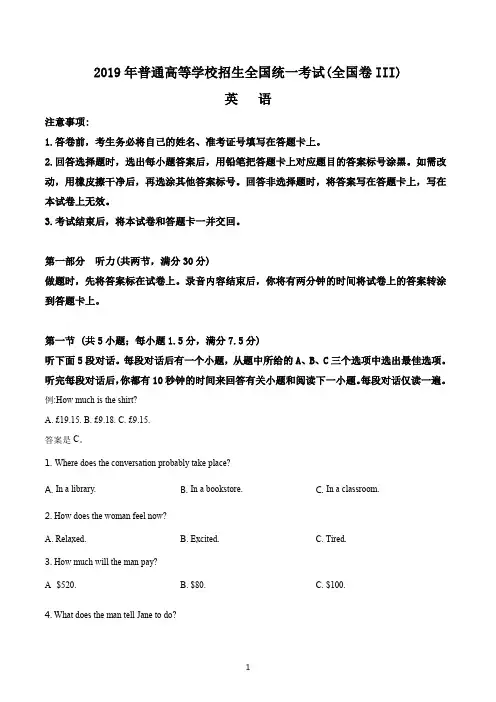
2019年普通高等学校招生全国统一考试(全国卷III)英语注意事项:1.答卷前,考生务必将自己的姓名、准考证号填写在答题卡上。
2.回答选择题时,选出每小题答案后,用铅笔把答题卡上对应题目的答案标号涂黑。
如需改动,用橡皮擦干净后,再选涂其他答案标号。
回答非选择题时,将答案写在答题卡上,写在本试卷上无效。
3.考试结束后,将本试卷和答题卡一并交回。
第一部分听力(共两节,满分30分)做题时,先将答案标在试卷上。
录音内容结束后,你将有两分钟的时间将试卷上的答案转涂到答题卡上。
第一节 (共5小题;每小题1.5分,满分7.5分)听下面5段对话。
每段对话后有一个小题,从题中所给的A、B、C三个选项中选出最佳选项。
听完每段对话后,你都有10秒钟的时间来回答有关小题和阅读下一小题。
每段对话仅读一遍。
例:How much is the shirt?A. £19.15.B. £9.18.C. £9.15.答案是C。
1. Where does the conversation probably take place?A. In a library.B. In a bookstore.C. In a classroom.2. How does the woman feel now?A. Relaxed.B. Excited.C. Tired.3. How much will the man pay?A$520. B. $80. C. $100.4. What does the man tell Jane to do?A. Postpone his appointment.B. Meet Mr. Douglas.C. Return at 3 o’clock.5. Why would David quit his job?A. To go back to school.B. To start his own firm.C. To work for his friend.第二节(共15小题;每小题1.5分,满分22.5分)听下面5段对话或独白。
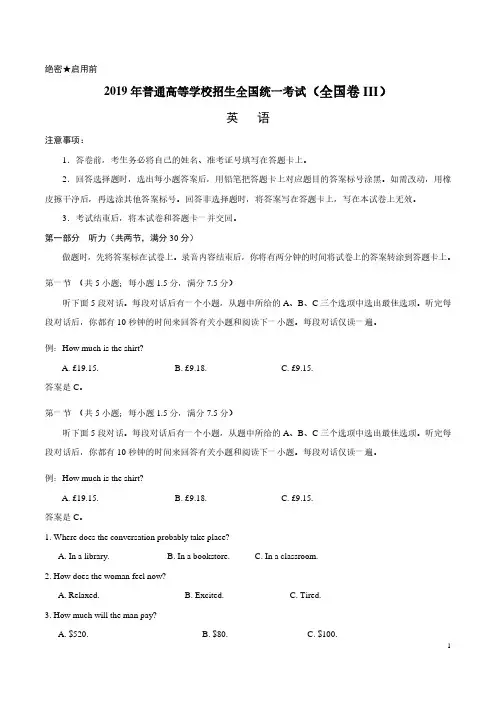
绝密★启用前2019年普通高等学校招生全国统一考试(全国卷III)英语注意事项:1.答卷前,考生务必将自己的姓名、准考证号填写在答题卡上。
2.回答选择题时,选出每小题答案后,用铅笔把答题卡上对应题目的答案标号涂黑。
如需改动,用橡皮擦干净后,再选涂其他答案标号。
回答非选择题时,将答案写在答题卡上,写在本试卷上无效。
3.考试结束后,将本试卷和答题卡一并交回。
第一部分听力(共两节,满分30分)做题时,先将答案标在试卷上。
录音内容结束后,你将有两分钟的时间将试卷上的答案转涂到答题卡上。
第一节(共5小题;每小题1.5分,满分7.5分)听下面5段对话。
每段对话后有一个小题,从题中所给的A、B、C三个选项中选出最佳选项。
听完每段对话后,你都有10秒钟的时间来回答有关小题和阅读下一小题。
每段对话仅读一遍。
例:How much is the shirt?A. £19.15.B. £9.18.C. £9.15.答案是C。
第一节(共5小题;每小题1.5分,满分7.5分)听下面5段对话。
每段对话后有一个小题,从题中所给的A、B、C三个选项中选出最佳选项。
听完每段对话后,你都有10秒钟的时间来回答有关小题和阅读下一小题。
每段对话仅读一遍。
例:How much is the shirt?A. £19.15.B. £9.18.C. £9.15.答案是C。
1. Where does the conversation probably take place?A. In a library.B. In a bookstore.C. In a classroom.2. How does the woman feel now?A. Relaxed.B. Excited.C. Tired.3. How much will the man pay?A. $520.B. $80.C. $100.4. What does the man tell Jane to do?A. Postpone his appointment.B. Meet Mr. Douglas.C. Return at 3 o’clock.5. Why would David quit his job?A. To go back to school.B. To start his own firm.C. To work for his friend.第二节(共15小题;每小题1.5分,满分22.5分)听下面5段对话或独白。
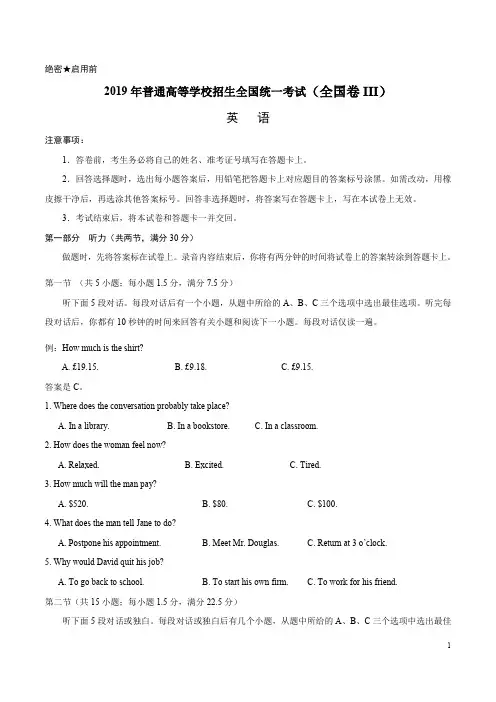
绝密★启用前2019年普通高等学校招生全国统一考试(全国卷III)英语注意事项:1.答卷前,考生务必将自己的姓名、准考证号填写在答题卡上。
2.回答选择题时,选出每小题答案后,用铅笔把答题卡上对应题目的答案标号涂黑。
如需改动,用橡皮擦干净后,再选涂其他答案标号。
回答非选择题时,将答案写在答题卡上,写在本试卷上无效。
3.考试结束后,将本试卷和答题卡一并交回。
第一部分听力(共两节,满分30分)做题时,先将答案标在试卷上。
录音内容结束后,你将有两分钟的时间将试卷上的答案转涂到答题卡上。
第一节(共5小题;每小题1.5分,满分7.5分)听下面5段对话。
每段对话后有一个小题,从题中所给的A、B、C三个选项中选出最佳选项。
听完每段对话后,你都有10秒钟的时间来回答有关小题和阅读下一小题。
每段对话仅读一遍。
例:How much is the shirt?A. £19.15.B. £9.18.C. £9.15.答案是C。
1. Where does the conversation probably take place?A. In a library.B. In a bookstore.C. In a classroom.2. How does the woman feel now?A. Relaxed.B. Excited.C. Tired.3. How much will the man pay?A. $520.B. $80.C. $100.4. What does the man tell Jane to do?A. Postpone his appointment.B. Meet Mr. Douglas.C. Return at 3 o’clock.5. Why would David quit his job?A. To go back to school.B. To start his own firm.C. To work for his friend.第二节(共15小题;每小题1.5分,满分22.5分)听下面5段对话或独白。
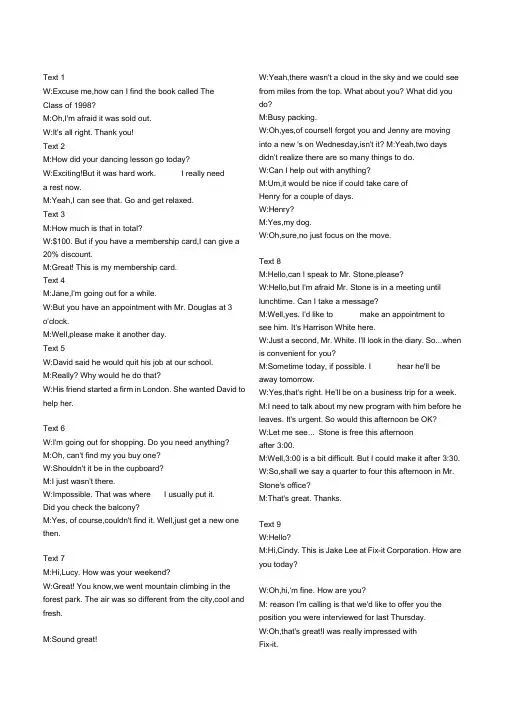
Text 1W:Excuse me,how can I find the book called TheClass of 1998?M:Oh,I'm afraid it was sold out.W:It's all right. Thank you!Text 2M:How did your dancing lesson go today?W:Exciting!But it was hard work. I really needa rest now.M:Yeah,I can see that. Go and get relaxed.Text 3M:How much is that in total?W:$100. But if you have a membership card,I can give a 20% discount.M:Great! This is my membership card.Text 4M:Jane,I'm going out for a while.W:But you have an appointment with Mr. Douglas at 3o'clock.M:Well,please make it another day.Text 5W:David said he would quit his job at our school.M:Really? Why would he do that?W:His friend started a firm in London. She wanted David to help her.Text 6W:I'm going out for shopping. Do you need anything? M:Oh, can't find my you buy one?W:Shouldn't it be in the cupboard?M:I just wasn't there.W:Impossible. That was where I usually put it.Did you check the balcony?M:Yes, of course,couldn't find it. Well,just get a new one then.Text 7M:Hi,Lucy. How was your weekend?W:Great! You know,we went mountain climbing in the forest park. The air was so different from the city,cool and fresh.M:Sound great! W:Yeah,there wasn't a cloud in the sky and we could see from miles from the top. What about you? What did you do?M:Busy packing.W:Oh,yes,of course!I forgot you and Jenny are moving into a new 's on Wednesday,isn't it? M:Yeah,two days didn't realize there are so many things to do.W:Can I help out with anything?M:Um,it would be nice if could take care ofHenry for a couple of days.W:Henry?M:Yes,my dog.W:Oh,sure,no just focus on the move.Text 8M:Hello,can I speak to Mr. Stone,please?W:Hello,but I'm afraid Mr. Stone is in a meeting until lunchtime. Can I take a message?M:Well,yes. I'd like to make an appointment tosee him. It's Harrison White here.W:Just a second, Mr. White. I'll look in the diary. So...when is convenient for you?M:Sometime today, if possible. I hear he'll be away tomorrow.W:Yes,that's right. He'll be on a business trip for a week. M:I need to talk about my new program with him before he leaves. It's urgent. So would this afternoon be OK?W:Let me see ... Stone is free this afternoonafter 3:00.M:Well,3:00 is a bit difficult. But I could make it after 3:30. W:So,shall we say a quarter to four this afternoon in Mr. Stone's office?M:That's great. Thanks.Text 9W:Hello?M:Hi,Cindy. This is Jake Lee at Fix-it Corporation. How are you today?W:Oh,hi,'m fine. How are you?M: reason I'm calling is that we'd like to offer you the position you were interviewed for last Thursday.W:Oh,that's great!I was really impressed withFix-it.M:I'm glad to hear it. And we'll prepare to offer you a starting salary of $55,000. W:I ...vacation time?M:Oh,you get one day per month in your first year. That is you'll have 12 days in your first year, and then increase if you stay longer with the company.W:What would be my job title?M:You'd be a junior specialist. And you'd be working under Monica Stansfield,the department manager.W:OK...Is the salary negotiable at all? M:Well,this is typical for new staff. W:I see...M:Why don't you think about it? I'll need to hear back from you by Wednesday. Will that work? W:Sure,no problem. I'll let you know Tuesday afternoon.Text 10Hello,everybody. Today I'd like to share with you something about John Audubon. John was born on April 26th,1785. He spent much of his childhood in France where he spent many hours each day outdoors painting pictures. At the age of 18,he moved to the United States. Well,actually,John began his life in the US as a businessman. However, instead of taking care of his business,John was often off exploring nature. At first,John spent his time hunting for fun. Then he found that the animals around were very beautiful,and he particularly enjoyed observing the birds he saw. He began studying them, trying to learn the differences between the birds and noticing their different behaviors. Therefore, he painted the birds he observed a lot. In 1819, John realized that he was very upset that he couldn't earn enough money to support his family. So he spent time improving his painting skills and began to sell his discovered that he could earn some money while doing something he really enjoyed. Weare lucky now to have so many paintings of American birds by John Audubon.2019 全国 3 卷高考英语试题参考答案第一部分听力1. B 2. C 3. B 4. A 5. C6. C7. A8. B9. A 10. C11. B 12. A 13. C 14. C 15. B16. A 17. C 18. A 19. B 20. Adidn't have enough money to pay his bills. He。
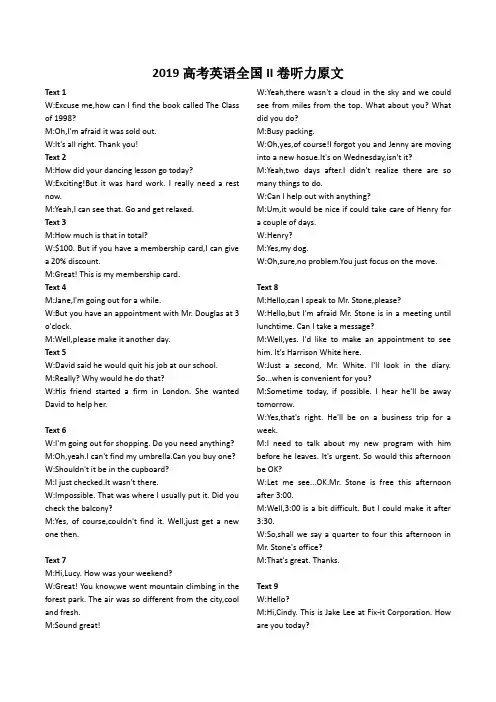
2019高考英语全国II卷听力原文Text 1W:Excuse me,how can I find the book called The Class of 1998?M:Oh,I'm afraid it was sold out.W:It's all right. Thank you!Text 2M:How did your dancing lesson go today?W:Exciting!But it was hard work. I really need a rest now.M:Yeah,I can see that. Go and get relaxed.Text 3M:How much is that in total?W:$100. But if you have a membership card,I can give a 20% discount.M:Great! This is my membership card.Text 4M:Jane,I'm going out for a while.W:But you have an appointment with Mr. Douglas at 3 o'clock.M:Well,please make it another day.Text 5W:David said he would quit his job at our school.M:Really? Why would he do that?W:His friend started a firm in London. She wanted David to help her.Text 6W:I'm going out for shopping. Do you need anything? M:Oh,yeah.I can't find my umbrella.Can you buy one? W:Shouldn't it be in the cupboard?M:I just checked.It wasn't there.W:Impossible. That was where I usually put it. Did you check the balcony?M:Yes, of course,couldn't find it. Well,just get a new one then.Text 7M:Hi,Lucy. How was your weekend?W:Great! You know,we went mountain climbing in the forest park. The air was so different from the city,cool and fresh.M:Sound great! W:Yeah,there wasn't a cloud in the sky and we could see from miles from the top. What about you? What did you do?M:Busy packing.W:Oh,yes,of course!I forgot you and Jenny are moving into a new hosue.It's on Wednesday,isn't it?M:Yeah,two days after.I didn't realize there are so many things to do.W:Can I help out with anything?M:Um,it would be nice if could take care of Henry for a couple of days.W:Henry?M:Yes,my dog.W:Oh,sure,no problem.You just focus on the move.Text 8M:Hello,can I speak to Mr. Stone,please?W:Hello,but I'm afraid Mr. Stone is in a meeting until lunchtime. Can I take a message?M:Well,yes. I'd like to make an appointment to see him. It's Harrison White here.W:Just a second, Mr. White. I'll look in the diary. So...when is convenient for you?M:Sometime today, if possible. I hear he'll be away tomorrow.W:Yes,that's right. He'll be on a business trip for a week.M:I need to talk about my new program with him before he leaves. It's urgent. So would this afternoon be OK?W:Let me see...OK.Mr. Stone is free this afternoon after 3:00.M:Well,3:00 is a bit difficult. But I could make it after 3:30.W:So,shall we say a quarter to four this afternoon in Mr. Stone's office?M:That's great. Thanks.Text 9W:Hello?M:Hi,Cindy. This is Jake Lee at Fix-it Corporation. How are you today?W:Oh,hi,Jake.I'm fine. How are you?M:Good.The reason I'm calling is that we'd like to offer you the position you were interviewed for last Thursday.W:Oh,that's great!I was really impressed with Fix-it. M:I'm glad to hear it. And we'll prepare to offer you a starting salary of $55,000.W:I see.And ...vacation time?M:Oh,you get one day per month in your first year. That is you'll have 12 days in your first year, and then increase if you stay longer with the company.W:What would be my job title?M:You'd be a junior specialist. And you'd be working under Monica Stansfield,the department manager. W:OK...Is the salary negotiable at all?M:Well,this is typical for new staff.W:I see...M:Why don't you think about it? I'll need to hear back from you by Wednesday. Will that work?W:Sure,no problem. I'll let you know Tuesday afternoon.Text 10Hello,everybody. Today I'd like to share with you something about John Audubon. John was born on April 26th,1785. He spent much of his childhood in France where he spent many hours each day outdoors painting pictures. At the age of 18,he moved to the United States. Well,actually,John began his life in the US as a businessman. However, instead of taking care of his business,John was often off exploring nature. At first,John spent his time hunting for fun. Then he found that the animals around were very beautiful,and he particularly enjoyed observing the birds he saw. He began studying them, trying to learn the differences between the birds and noticing their different behaviors. Therefore, he painted the birds he observed a lot. In 1819, John realized that he didn't have enough money to pay his bills. He was very upset that he couldn't earn enough money to support his family. So he spent time improving his painting skills and began to sell his paintings.He discovered that he could earn some money while doing something he really enjoyed. We are lucky now to have so many paintings of American birds by John Audubon.2019全国3卷高考英语试题参考答案第一部分听力1. B2. C3. B4. A5. C6. C7. A8. B9. A 10. C11. B 12. A 13. C 14. C 15. B16. A 17. C 18. A 19. B 20. A。
2019年普通高等学校招生全国统一考试(全国卷III)英语注意事项:1.答卷前,考生务必将自己的姓名、准考证号填写在答题卡上。
2.回答选择题时,选出每小题答案后,用铅笔把答题卡上对应题目的答案标号涂黑。
如需改动,用橡皮擦干净后,再选涂其他答案标号。
回答非选择题时,将答案写在答题卡上,写在本试卷上无效。
3.考试结束后,将本试卷和答题卡一并交回。
第一部分听力(共两节,满分30分)做题时,先将答案标在试卷上。
录音内容结束后,你将有两分钟的时间将试卷上的答案转涂到答题卡上。
第一节(共5小题;每小题1.5分,满分7.5分)听下面5段对话。
每段对话后有一个小题,从题中所给的A、B、C三个选项中选出最佳选项。
听完每段对话后,你都有10秒钟的时间来回答有关小题和阅读下一小题。
每段对话仅读一遍。
例:How much is the shirt?A. £19.15.B. £9.18.C. £9.15.答案是C。
第一节(共5小题;每小题1.5分,满分7.5分)听下面5段对话。
每段对话后有一个小题,从题中所给的A、B、C三个选项中选出最佳选项。
听完每段对话后,你都有10秒钟的时间来回答有关小题和阅读下一小题。
每段对话仅读一遍。
例:How much is the shirt?A. £19.15.B. £9.18.C. £9.15.答案是C。
1. Where does the conversation probably take place?A. In a library.B. In a bookstore.C. In a classroom.2. How does the woman feel now?A. Relaxed.B. Excited.C. Tired.3. How much will the man pay?A. $520.B. $80.C. $100.4. What does the man tell Jane to do?A. Postpone his appointment.B. Meet Mr. Douglas.C. Return at 3 o’clock.5. Why would David quit his job?A. To go back to school.B. To start his own firm.C. To work for his friend.第二节(共15小题;每小题1.5分,满分22.5分)听下面5段对话或独白。
绝密★启用前2019年普通高等学校招生全国统一考试(全国卷III)英语注意事项:1.答卷前,考生务必将自己的姓名、准考证号填写在答题卡上。
2.回答选择题时,选出每小题答案后,用铅笔把答题卡上对应题目的答案标号涂黑。
如需改动,用橡皮擦干净后,再选涂其他答案标号。
回答非选择题时,将答案写在答题卡上,写在本试卷上无效。
3.考试结束后,将本试卷和答题卡一并交回。
第一部分听力(共两节,满分30分)做题时,先将答案标在试卷上。
录音内容结束后,你将有两分钟的时间将试卷上的答案转涂到答题卡上。
第一节(共5小题;每小题1.5分,满分7.5分)听下面5段对话。
每段对话后有一个小题,从题中所给的A、B、C三个选项中选出最佳选项。
听完每段对话后,你都有10秒钟的时间来回答有关小题和阅读下一小题。
每段对话仅读一遍。
例:How much is the shirt?A. £19.15.B. £9.18.C. £9.15.答案是C。
第一节(共5小题;每小题1.5分,满分7.5分)听下面5段对话。
每段对话后有一个小题,从题中所给的A、B、C三个选项中选出最佳选项。
听完每段对话后,你都有10秒钟的时间来回答有关小题和阅读下一小题。
每段对话仅读一遍。
例:How much is the shirt?A. £19.15.B. £9.18.C. £9.15.答案是C。
1. Where does the conversation probably take place?A. In a library.B. In a bookstore.C. In a classroom.2. How does the woman feel now?A. Relaxed.B. Excited.C. Tired.3. How much will the man pay?A. $520.B. $80.C. $100.4. What does the man tell Jane to do?A. Postpone his appointment.B. Meet Mr. Douglas.C. Return at 3o’clock.5. Why would David quit his job?A. To go back to school.B. To start his own firm.C. To work for his friend.第二节(共15小题;每小题1.5分,满分22.5分)听下面5段对话或独白。
2019年高考全国III卷英语听力(含听力音频、听力原文和答案)2019 XXX(Gaokao) English Listening Test Paper IIIfor Gaokao 2019 nal College XXX English Listening Test Paper III。
Double-click the icon to listen。
(Please use a computer to open and listen.)ns: XXX。
Guangxi。
Guizhou。
Sichuan。
XXXPart One Listening (30 points in total)During the test。
mark the answers on the test paper first。
After the recording is finished。
you will have two minutes to transfer the answers on the test paper to the answer sheet.n One (7.5 points in total)Listen to the following 5 XXX。
there is a n with three ns A。
B。
and C。
Choose the best answer from the ns。
You will have10 seconds to answer each n and read the next one。
Each XXX only once。
Example: How much is the shirt。
A。
£19.15.The answer is C.1.Where does the XXX?2.How does the woman feel now?3.How much will the man pay?4.What does the man tell Jane to do?5.Why would David quit his job?n Two (22.5 points in total)Listen to the following 5 XXX。
文档说明:1. 本文档经过本人认真校对并排版,能力有限,难免有不良之处。
欢迎指出。
2. 试卷的听力,根据录音MP3校对,整理出录音文稿。
3. 文档板式:中文字体是宋体五号;英文是Times New Roman 小四。
页眉有内容提要,页脚有页码。
4. 全国III卷适用地区:云南、四川、广西、贵州、西藏2019年普通高等学校招生全国统一考试(全国卷III)英语(含答案听力录音文稿)注意事项:1.答卷前,考生务必将自己的姓名、准考证号填写在答题卡上。
2.回答选择题时,选出每小题答案后,用铅笔把答题卡上对应题目的答案标号涂黑。
如需改动,用橡皮擦干净后,再选涂其他答案标号。
回答非选择题时,将答案写在答题卡上,写在本试卷上无效。
3.考试结束后,将本试卷和答题卡一并交回。
第一部分听力(共两节,满分30分)做题时,先将答案标在试卷上。
录音内容结束后,你将有两分钟的时间将试卷上的答案转涂到答题卡上。
第一节(共5小题;每小题1.5分,满分7.5分)听下面5段对话。
每段对话后有一个小题,从题中所给的A、B、C三个选项中选出最佳选项。
听完每段对话后,你都有10秒钟的时间来回答有关小题和阅读下一小题。
每段对话仅读一遍。
例:How much is the shirt?A. £19.15.B. £9.18.C. £9.15.答案是C。
1. Where does the conversation probably take place?A. In a library.B. In a bookstore.C. In a classroom.2. How does the woman feel now?A. Relaxed.B. Excited.C. Tired.3. How much will the man pay?A. $520.B. $80.C. $100.4. What does the man tell Jane to do?A. Postpone his appointment.B. Meet Mr. Douglas.C. Return at 3 o’clock.5. Why would David quit his job?A. To go back to school.B. To start his own firm.C. To work for his friend. 第二节(共15小题;每小题1.5分,满分22.5分)听下面5段对话或独白。
绝密★启用前2019年普通高等学校招生全国统一考试(全国卷III)英语注意事项:1.答卷前,考生务必将自己的姓名、准考证号填写在答题卡上。
2.回答选择题时,选出每小题答案后,用铅笔把答题卡上对应题目的答案标号涂黑。
如需改动,用橡皮擦干净后,再选涂其他答案标号。
回答非选择题时,将答案写在答题卡上,写在本试卷上无效。
3.考试结束后,将本试卷和答题卡一并交回。
第一部分听力(共两节,满分30分)做题时,先将答案标在试卷上。
录音内容结束后,你将有两分钟的时间将试卷上的答案转涂到答题卡上。
第一节(共5小题;每小题1.5分,满分7.5分)听下面5段对话。
每段对话后有一个小题,从题中所给的A、B、C三个选项中选出最佳选项。
听完每段对话后,你都有10秒钟的时间来回答有关小题和阅读下一小题。
每段对话仅读一遍。
例:How much is the shirt?A. £19.15.B. £9.18.C. £9.15.答案是C。
第一节(共5小题;每小题1.5分,满分7.5分)听下面5段对话。
每段对话后有一个小题,从题中所给的A、B、C三个选项中选出最佳选项。
听完每段对话后,你都有10秒钟的时间来回答有关小题和阅读下一小题。
每段对话仅读一遍。
例:How much is the shirt?A. £19.15.B. £9.18.C. £9.15.答案是C。
1. Where does the conversation probably take place?A. In a library.B. In a bookstore.C. In a classroom.2. How does the woman feel now?A. Relaxed.B. Excited.C. Tired.3. How much will the man pay?A. $520.B. $80.C. $100.4. What does the man tell Jane to do?A. Postpone his appointment.B. Meet Mr. Douglas.C. Return at 3 o’clock.5. Why would David quit his job?A. To go back to school.B. To start his own firm.C. To work for his friend.第二节(共15小题;每小题1.5分,满分22.5分)听下面5段对话或独白。
文档说明:1. 本文档经过本人认真校对并排版,能力有限,难免有不良之处。
欢迎指出。
2. 试卷的听力,根据录音MP3校对,整理出录音文稿。
3. 文档板式:中文字体是宋体五号;英文是Times New Roman 小四。
页眉有内容提要,页脚有页码。
4. 全国III卷适用地区:云南、四川、广西、贵州、西藏2019年普通高等学校招生全国统一考试(全国卷III)英语(含答案听力录音文稿)注意事项:1.答卷前,考生务必将自己的姓名、准考证号填写在答题卡上。
2.回答选择题时,选出每小题答案后,用铅笔把答题卡上对应题目的答案标号涂黑。
如需改动,用橡皮擦干净后,再选涂其他答案标号。
回答非选择题时,将答案写在答题卡上,写在本试卷上无效。
3.考试结束后,将本试卷和答题卡一并交回。
第一部分听力(共两节,满分30分)做题时,先将答案标在试卷上。
录音内容结束后,你将有两分钟的时间将试卷上的答案转涂到答题卡上。
第一节(共5小题;每小题1.5分,满分7.5分)听下面5段对话。
每段对话后有一个小题,从题中所给的A、B、C三个选项中选出最佳选项。
听完每段对话后,你都有10秒钟的时间来回答有关小题和阅读下一小题。
每段对话仅读一遍。
例:How much is the shirt?A. £19.15.B. £9.18.C. £9.15.答案是C。
1. Where does the conversation probably take place?A. In a library.B. In a bookstore.C. In a classroom.2. How does the woman feel now?A. Relaxed.B. Excited.C. Tired.3. How much will the man pay?A. $520.B. $80.C. $100.4. What does the man tell Jane to do?A. Postpone his appointment.B. Meet Mr. Douglas.C. Return at 3 o’clock.5. Why would David quit his job?A. To go back to school.B. To start his own firm.C. To work for his friend. 第二节(共15小题;每小题1.5分,满分22.5分)听下面5段对话或独白。
每段对话或独白后有几个小题,从题中所给的A、B、C三个选项中选出最佳选项。
听每段对话或独白前,你将有时间阅读各个小题,每小题5秒钟;听完后,各小题将给出5秒钟的作答时间。
每段对话或独白读两遍。
听第6段材料,回答第6、7题。
6. What does the man want the woman to do?A. Check the cupboard.B. Clean the balcony.C. Buy an umbrella.7. What is the probable relationship between the speakers?A. Husband and wife.B. Employer and employee.C. Shop assistant and customer.听第7段材料,回答第8至10题。
8. Where did the woman go at the weekend?A. The city centre.B. The forest park.C. The man’s home.9. How did the man spend his weekend?A. Packing for a move.B. Going out with Jenny.C. Looking for a new house.10. What will the woman do for the man?A. Take Henry to hospital.B. Stay with his kid.C. Look after his pet. 听第8段材料,回答第11至13题。
11. What is Mr. Stone doing now?A. Eating lunch.B. Having a meeting.C. Writing a diary.12. Why does the man want to see Mr. Stone?A. To discuss a program.B. To make a travel plan.C. To ask for sick leave.13. When will the man meet Mr. Stone this afternoon?A. At 3:00.B. At 3:30.C. At 3:45.听第9段材料,回答第14至16题。
14. What are the speakers talking about?A. A company.B. An interview.C. A job offer.15. Who is Monica Stansfield?A. A junior specialist.B. A department manager.C. A sales assistant.16. When will the man hear from the woman?A. On Tuesday.B. On Wednesday.C. On Thursday.听第10段材料,回答第17至20题。
17. What did John enjoy doing in his childhood?A. Touring France.B. Playing outdoors.C. Painting pictures.18. What did John do after he moved to the US?A. He did business.B. He studied biology.C. He worked on a farm.19. Why did John go hunting?A. For food.B. For pleasure.C. For money.20. What is the subject of John’s works?A. American birds.B. Natural scenery.C. Family life.第二部分阅读理解(共两节,满分40分)第一节(共15小题;每小题2分,满分30分)阅读下列短文,从每题所给的A、B、C和D四个选项中,选出最佳选项。
AOPENINGS AND PREVIEWSAnimals Out of PaperYolo!Productions and the Great Griffon present the play by Rajiv Joseph, in which an origami(折纸术)artist invites a teenage talent and his teacher into her studio. Merri Milwe directs. In previews. Opens Feb.12.(West Park Presbyterian Church,165 W.86th St.212-868-4444.)The AudienceHelen Mirren stars in the play by Peter Morgan,about Queen Elizabeth II of the UK and her private meetings with twelve Prime Ministers in the course of sixty years. Stephen Daldry directs. Also starring Dylan Baker and Judith Ivey. Previews begin Feb.14.(Schoenfeld,236 W.45th St.212-239-6200.)HamiltonLin-Manuel Miranda wrote this musical about Alexander Hamilton,in which the birth of America is presented as an immigrant story. Thomas Kail directs. In previews. Opens Feb.17.(Public,425 Lafayette St.212-967-7555.)On the Twentieth CenturyKristin Chenoweth and Peter Gallagher star in the musical comedy by Betty Comden and Adolph Green,about a Broadway producer who tries to win a movie star’s love during a cross-country train journey. Scott Ellis directs, for Roundabout Theatre Company. Previews begin Feb.12.(American Airlines Theatre, 227 W.42nd St.212-719-1300.)21. What is the play by Rajiv Joseph probably about?.A.A type of art.B.A teenager's studio.C.A great teacher.D.A group of animals.22. Who is the director of The Audience?A.Helen Mirren.B.Peter Morgan.C.Dylan Baker.D.Stephen Daldry.23. Which play will you go to if you are interested in American history?A.Animals Out of Paper.B.The Audience.C.Hamilton.D.On the Twentieth Century.BFor Western designers, China and its rich culture have long been an inspiration for Western creative."It's no secret that China has always been a source(来源)of inspiration for designers," says Amanda Hill, chief creative officer at A+E Networks, a global media company and home to some of the biggest fashion(时尚)shows.Earlier this year, the China Through A Looking Glass exhibition in New York exhibited 140 pieces of China-inspired fashionable clothing alongside Chinese works of art, with the aim of exploring the influence of Chinese aesthetics(美学)on Western fashion and how China has fueled the fashionable imagination for centuries. The exhibition had record attendance, showing that there is huge interest in Chinese influences."China is impossible to overlook," says Hill. "Chinese models are the faces of beauty and fashion campaigns that sell dreams to women all over the world, which means Chinese women are not just consumers of fashion —they are central to its movement. "Of course, only are today's top Western designers being influenced by China —some of the best designers of contemporary fashion are themselves Chinese." Vera Wang, Alexander Wang, Jason Wu are taking on Galiano, Albaz, Marc Jacobs-and beating them hands down in design and sales," adds Hill.For Hill, it is impossible not to talk about China as the leading player when discussing fashion. "The most famous designers are Chinese, so are the models, and so are the consumers," she says. "China is no longer just another market; in many senses it has become the market. If you talk about fashion today, you are talking about China —its influences, its direction, its breathtaking clothes, and how young designers and models are finally acknowledging that in many ways."24.What can we learn about the exhibition in New York?A.It promoted the sales of artworks.B.It attracted a large number of visitors.C.It showed ancient Chinese clothes.D.It aimed to introduce Chinese models.25.What does Hill say about Chinese women?A.They are setting the fashion.B.They start many fashion campaigns.C.They admire super models.D.They do business all over the world.26.What do the underlined words "taking on" in paragraph 4 mean?A.learning fromB.looking down onC.working withpeting against27.What can be a suitable title for the text?A.Young Models Selling Dreams to the WorldB.A Chinese Art Exhibition Held in New YorkC.Differences Between Eastern and Western AestheticsD.Chinese Culture Fueling International Fashion TrendsCBefore the 1830s,most newspapers were sold through annual subscriptions in America, usually $8 to $10 a year. Today $8 or $10 seems a small amount of money, but at that time these amounts were forbidding to most citizens. Accordingly, newspapers were read almost only by rich people in politics or the trades. In addition, most newspapers had little in them that would appeal to a mass audience. They were dull and visually forbidding. But the revolution that was taking place in the 1830s would change all that.The trend, then, was toward the "penny paper"— a term referring to papers made widely available to the public. It meant any inexpensive newspaper; perhaps more importantly it meant newspapers that could be bought in single copies on the street.This development did not take place overnight. It had been possible(but not easy)to buy single copies of newspapers before 1830,but this usually meant the reader had to go down to the printer's office to purchase a copy. Street sales were almost unknown. However, within a few years, street sales of newspapers would becommonplace in eastern cities. At first the price of single copies was seldom a penny—usually two or three cents was charged —and some of the older well-known papers charged five or six cents. But the phrase "penny paper " caught the public's fancy, and soon there would be papers that did indeed sell for only a penny.This new trend of newspapers for "the man on the street" did not begin well. Some of the early ventures(企业)were immediate failures. Publishers already in business, people who were owners of successful papers, had little desire to change the tradition. It took a few youthful and daring businessmen to get the ball rolling.28.Which of the following best describes newspapers in America before the 1830s?A.Academic.B.Unattractive.C.Inexpensive.D.Confidential.29.What did street sales mean to newspapers?A.They would be priced higher.B.They would disappear from cities.C.They could have more readers.D.They could regain public trust.30.Who were the newspapers of the new trend targeted at?A.Local politicians.mon people.C.Young publishers.D.Rich businessmen.31.What can we say about the birth of the penny paper?A.It was a difficult process.B.It was a temporary success.C.It was a robbery of the poor.D.It was a disaster for printers.DMonkeys seem to have a way with numbers.A team of researchers trained three Rhesus monkeys to associate 26 clearly different symbols consisting of numbers and selective letters with 0-25 drops of water or juice as a reward. The researchers then tested how the monkeys combined—or added—the symbols to get the reward.Here's how Harvard Medical School scientist Margaret Livingstone, who led the team, described the experiment: In their cages the monkeys were provided with touch screens. On one part of the screen, a symbol would appear, and on the other side two symbols inside a circle were shown. For example, the number 7 would flash on one side of the screen and the other end would have 9 and 8. If the monkeys touched the left side of the screen they would be rewarded with seven drops of water or juice; if they went for the circle, they would be rewarded with the sum of the numbers—17 in this example.After running hundreds of tests, the researchers noted that the monkeys would go for the higher values more than half the time, indicating that they were performing a calculation, not just memorizing the value of each combination.When the team examined the results of the experiment more closely, they noticed that the monkeys tended to underestimate(低估)a sum compared with a single symbol when the two were close in value—sometimes choosing, for example, a 13 over the sum of 8 and 6. The underestimation was systematic: When adding two numbers, the monkeys always paid attention to the larger of the two, and then addedonly a fraction(小部分)of the smaller number to it."This indicates that there is a certain way quantity is represented in their brains, "Dr. Livingstone says. “But in this experiment what they're doing is paying more attention to the big number than the little one.”32. What did the researchers do to the monkeys before testing them?A.They fed them.B.They named them.C.They trained them.D.They measured them.33. How did the monkeys get their reward in the experiment?A.By drawing a circle.B.By touching a screen.C.By watching videos.D.By mixing two drinks.34. What did Livingstone's team find about the monkeys?A.They could perform basic addition.B.They could understand simple words.C.They could memorize numbers easily.D.They could hold their attention for long.35. In which section of a newspaper may this text appear?A.Entertainment.B.Health.cation.D.Science.第二节(共5小题;每小题2分,满分10分)根据短文内容,从短文后的选项中选出能填入空白处的最佳选项。